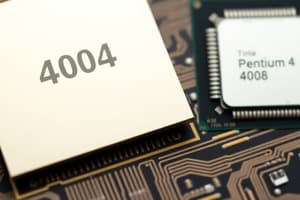Podcast
Questions and Answers
What material was a likely change from aluminum to inside the microprocessor?
What material was a likely change from aluminum to inside the microprocessor?
- Silver
- Gold
- Steel
- Copper (correct)
Which microprocessor had a faster core than the Pentium II and was a P6 or Pentium Pro processor?
Which microprocessor had a faster core than the Pentium II and was a P6 or Pentium Pro processor?
- Pentium III (correct)
- Pentium II
- Core2
- Pentium 4
What was another name for the socket 370 version of the Pentium III microprocessor?
What was another name for the socket 370 version of the Pentium III microprocessor?
- Plastic cartridge
- Core2
- Flip-chip (correct)
- Slot 1
Which microprocessor was available with clock frequencies up to 1 GHz?
Which microprocessor was available with clock frequencies up to 1 GHz?
What is a characteristic of the Pentium II microprocessor?
What is a characteristic of the Pentium II microprocessor?
In terms of interconnections, what was considered a better conductor than aluminum?
In terms of interconnections, what was considered a better conductor than aluminum?
How many transistors are in the Pentium Pro Processor?
How many transistors are in the Pentium Pro Processor?
What is the clock frequency of the Pentium Pro Processor?
What is the clock frequency of the Pentium Pro Processor?
Which type of cache does the Pentium Pro Processor have?
Which type of cache does the Pentium Pro Processor have?
How many instructions can the Pentium Pro Processor execute at a time?
How many instructions can the Pentium Pro Processor execute at a time?
What market was the Intel Pentium Pro optimized for?
What market was the Intel Pentium Pro optimized for?
What is the maximum memory system size that the Pentium Pro Processor can address?
What is the maximum memory system size that the Pentium Pro Processor can address?
What bus speed was used by the newer Pentium II in 1998?
What bus speed was used by the newer Pentium II in 1998?
Which Intel processor was specifically designed for high-end workstation and server applications in mid-1998?
Which Intel processor was specifically designed for high-end workstation and server applications in mid-1998?
What is the L2 cache size available for the Xeon processor?
What is the L2 cache size available for the Xeon processor?
Which Intel processor is actually a Pentium Pro with MMX extensions?
Which Intel processor is actually a Pentium Pro with MMX extensions?
What architecture does the Core2 Microprocessor have with 64-bit Extensions?
What architecture does the Core2 Microprocessor have with 64-bit Extensions?
In 1998, what chip set did the Xeon processor function with?
In 1998, what chip set did the Xeon processor function with?
Flashcards are hidden until you start studying
Study Notes
Microprocessor Development
- A likely change from aluminum inside the microprocessor was to copper, which is a better conductor in terms of interconnections.
Pentium II Microprocessor
- The Pentium II microprocessor had a characteristic of a separate carcass for the processor and the cache, which made it more expensive to produce.
- The newer Pentium II in 1998 used a bus speed of 100 MHz.
Pentium Pro Processor
- The Pentium Pro Processor had 5.5 million transistors.
- The clock frequency of the Pentium Pro Processor was 200 MHz.
- The Pentium Pro Processor had a dynamic execution micro-architecture with a 16KB L1 cache and a 256KB or 512KB L2 cache.
- The Pentium Pro Processor could execute 3 instructions at a time.
- The Pentium Pro Processor was optimized for the high-end workstation and server market.
- The maximum memory system size that the Pentium Pro Processor could address was 64 GB.
Pentium III Microprocessor
- The Pentium III microprocessor was available with clock frequencies up to 1 GHz.
- The socket 370 version of the Pentium III microprocessor was also known as the Coppermine.
Xeon Processor
- The Xeon processor was specifically designed for high-end workstation and server applications in mid-1998.
- The Xeon processor functioned with the 440GX chip set in 1998.
- The L2 cache size available for the Xeon processor was 512KB, 1MB, or 2MB.
- The Xeon processor was a Pentium Pro with MMX extensions.
Core2 Microprocessor
- The Core2 Microprocessor had an architecture with 64-bit Extensions.
Miscellaneous
- The Pentium Pro processor was a P6 processor, which had a faster core than the Pentium II.
Studying That Suits You
Use AI to generate personalized quizzes and flashcards to suit your learning preferences.




